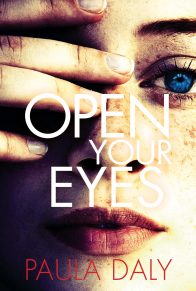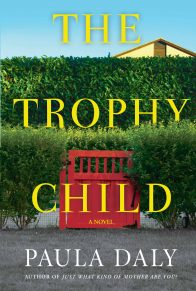That evening George and I picnicked in the back garden. I grabbed a few bits and pieces from the village: a pot of reduced-priced hummus, some locally produced pastrami (with a same-day expiration date), a cucumber and a baguette that was down to ten pence because it had taken a bit of a bashing in transit.
From the outside looking in, you might think things were pretty much perfect. The heat of the day was on the wane. George was happy, pushing slices of peppered beef into his mouth, his school polo shirt covered with a combination of grass stains, spots of pollen and a formless yellow mark around the collar that I would later realize was sun cream.
I could hear Celia and Dennis over the fence pottering around in their garden, Dennis softly whistling the theme to The Waltons, Celia keeping up a low-level steady chatter, punctuating it occasionally with “Dennis, start listening to me now,” when she needed to impart something crucial.
The holiday cottage on the other side was home for the week to a quiet, bookish, newly wedded couple from Billericay. They were the type of people who wore perpetual looks of apology simply for being there, which, I have to say, made a nice change from the boisterous, unrestrained groups of late. Last week, I had politely asked a gentleman in a Leeds United shirt if he wouldn’t mind repositioning the barbecue a little further from the house so that the crosswind didn’t carry the thick smoke right across our patio, and he’d responded by calling me a fucking lesbian.
I watched George chew, the straw-coloured light bouncing off his hair, the missing patch above his ear less apparent now. I really should neaten that up, I thought, though I knew I wouldn’t. Petra said I was in the habit of holding on to George’s babyish traits, which I thought of as endearing rather than babyish. She often chided me if I failed to correct George’s speech, but I liked it when he said “brang” instead of “brought”, when he told me he’d “writted” me a letter, when he confused his Ps and Bs, asking me to pass the PBA glue. These things, I knew, would be gone all too soon, and I was in no hurry to see the back of them.
I pulled a daisy from the grass and passed it to George. He rolled his eyes. Too girly.
“What did you do at school today?”
“Science,” he said.
“Did you do an experiment?”
“We put white blocks into different bottles to see what would happen.”
“Different bottles of what?”
He shrugged. “Milk and Coke and stuff.”
I remembered this experiment. It was used to demonstrate the rates of decay on teeth, the idea being kids would make wise choices when deciding what to drink. The thrust of it appeared to be lost on George.
George finished chewing. He said, “Finn Gibson-Morris says we would be rich, too, if we had a restaurant, like his parents.”
“Did he?” I replied flatly.
“He gets tons and tons of stuff, Mum. His parents have, like, so much money that they–”
“His parents don’t own their own home. They rent.”
He frowned. “Don’t we rent?”
“Yes, but we’re not going around making little kids feel shitty because they don’t have much money.”
I’d heard a lot about Finn Gibson-Morris. Not just from George but from his little buddies at school. This line of conversation cropped up every week or so and, usually, I had the good grace to hold my tongue. Not today.
“You finished?” I asked George, motioning to his plate, and he nodded. “Go and fetch yourself an apple then.”
I watched him go, his skinny, tanned legs, hyper-extended at the back of the knee. He’d inherited his hypermobility from Winston. He could pull his thumb all the way back so that it touched his forearm–like Winston.
I’ve never known a man so agile, so flexible, as Winston Toovey. It was the reason we met. His left patella would frequently end up around the outside of his leg, and I would stabilize it so as to allow him to walk again. I managed two treatment sessions before I acquiesced and agreed to a date, disregarding the Chartered Society’s directive advising against physio/patient relationships.
Turned out they were right about that, but not for the reasons they listed.
I watched George emerge from the back door, bite hard into the apple and wince. One of his milk teeth was stubbornly hanging on till the death and he would forget about it until it pained him. “You okay?” I called out, and he took the fruit from his mouth, adjusted the tooth with his finger, pushing it back into the gum.
“Yep,” he said, as his attention was caught by a bold lamb that had strayed from the flock, closing in on the stone wall that bordered the back of the garden. Something about the way George gazed at it–kind of sad and reflective–made the breath catch in my throat. Perhaps he knew that the lamb would soon be removed, ready for slaughter, on account of being born the wrong gender. George made a flicking action, as if shaking the thought from his head, and asked if he could go next door to see Foxy.
“Don’t get under Celia’s feet,” I warned.
When he’d gone there was a knock at the front door and the postman stood there, holding out a letter. “Special Delivery,” he said, “I need a signature.”
I took the letter, thanked him, and went inside. Sitting on the back step, I opened it, knowing what it was.
An eviction notice. I had two weeks.
I was three months behind on the rent and I had absolutely no way of paying it.
In the end, all it had taken was one unexpected bill and my weekly budget had been blown. My car had needed two new tires and a timing belt. The cost was close to eight hundred pounds. My dad had been nagging me for near to a year to change the timing belt, saying it was long overdue, that if I didn’t have it done it would break and the car would be wrecked in the process. Eventually, I’d gone through with it, knowing I didn’t have enough to pay the rent but, without the car, I couldn’t get to work. Couple that with the winter heating bill that I’d been delayed in paying, and I was in a spiral of debt.
And now I was in real trouble.
And not the paltry kind of financial trouble that can be passed off with more credit cards, letters of regret and apology, with promises of minimal monthly payments.
I was about to lose the house.
I was about to lose everything.
Chapter 10
“Can we talk?”
“I hoped you’d call,” he said. “I hoped . . .” then Scott Elias paused, giving a small exhalation that sounded to me very much like relief. “I really didn’t expect to hear from you so soon,” he said.
“Listen,” I began, “I’d rather not do this over the phone but, just so you know, my circumstances have changed. I would like to reconsider your offer if it’s still available.”
“Okay,” he said slowly. “Perhaps we should meet. I mean, to discuss it further. I expect there are some things you’d like to clarify.”
I tried to keep my tone businesslike as I issued the instructions I’d decided upon earlier, but there was an unmistakable tremor to my voice. “I’ve got a forty-five minute lunch break,” I said. “Come to the clinic, it will be safer than meeting out in the open. We won’t arouse suspicion if we act as though I’ve slotted you in as an extra patient.”
“That makes sense.”
“We’ll be able to talk undisturbed.”
“What time should I be there?”
“One-fifteen,” I said. “Try not to be late.”
“I’m never late.”
When I cut the call I placed the phone down on the desk with a trembling hand. Then I waited a moment before calling in the next patient to observe myself in this act of treachery. I rose and faced the mirror. I had the hardened, pinched look of a woman who at first you would presume to be vexed, but on closer inspection would realize was terrified.
Throughout the night I’d wrestled with the idea of Scott’s proposal.
Would I? Wouldn’t I?
Could I? How could I?
I came to no clear conclusions.
When I let my thoughts run free, it seemed almost easy. Sleep with a man and my monetary problems were solved .
I kept trying to convince myself I’d had to do worse things – my physiotherapy training for one.
Assisting stroke victims to the bathroom, some of them over six feet tall, heavy, and with one side paralysed to the extent that it could feel like you were trying to lift a cadaver, required more in the way of acting, more joviality in the face of dismayed horror, than any night spent with Scott Elias.
When I thought about it in those terms, I had no doubt I could do it.
But it was when I thought about the risks involved, the risk of being found out, the risk of destroying Nadine–Nadine, his wife, my sister’s friend. Not to mention the fact that I had made a promise to myself that I would never ever go near another woman’s husband. Not after the devastation wreaked by Winston back in his heyday. When I thought about all that, I was absolutely certain I could not do it.
But now the call was made.
And the remainder of the morning was spent on autopilot. If you asked me to recall one conversation, one patient’s viewpoint on the news of the day, I could not. I avoided Wayne. At one point he knocked on my door when I was in between patients, bringing me a coffee. He placed the cup on my desk and asked if I was okay. Asked if there was anything he could do to help as I seemed unsettled about something this morning and he was always there for me. I knew that, right? It was sweet of him but I told him I was fine, told him I appreciated his concern. Whether I duped him or not, I couldn’t say, but he left without speaking, except to inform me that my next patient had nipped outside to make a phone call to his daughter’s school. Should I be wondering where he was.
By the time the clock edged close to one-fifteen I was soaked with sweat and probably not in the best state to receive the man who was on his way over to discuss having sex with me for money.
He knocked on the door firmly, avoiding the reception area, and said, “Thanks for fitting me in at the last minute,” as I opened the door.
I didn’t reply. I should have, if only for Wayne’s benefit, but my throat was so parched the most I could do was to nod and swallow, ushering him in with a wave of the hand.













